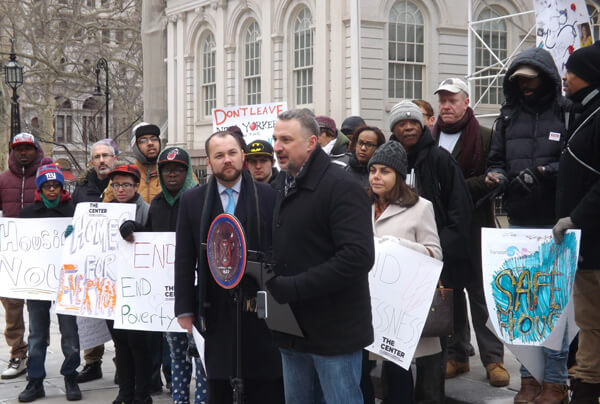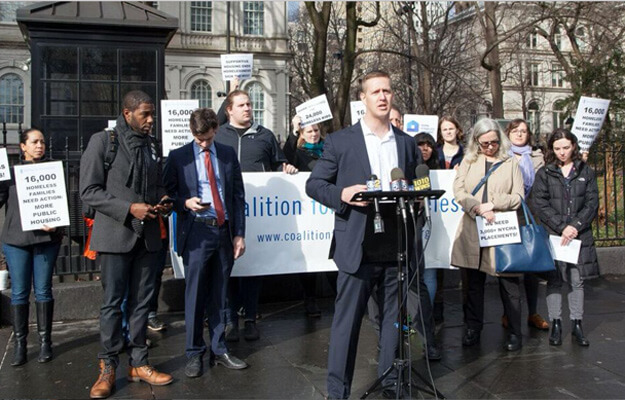City Councilmember Corey Johnson and Ali Forney Center executive director Carl Siciliano at the February 26 City Hall press conference. | GAY CITY NEWS
Legislation that would give the benefits currently provided to people with AIDS by the city’s HIV/ AIDS Services Administration (HASA) to people who are HIV-positive but asymptomatic was introduced in the City Council, but it likely faces an uphill battle to be enacted.
“We recognize that HIV is an epidemic that thrives on inequality,” said Corey Johnson, the city councilmember who represents Hell’s Kitchen, Chelsea, and the West Village, at a February 26 press conference at City Hall. “To fight it, we must keep our focus on the socioeconomic factors that have allowed it to continue for all of these years –– poverty, homelessness, and a lack of access to healthcare.”
Currently, people who have an AIDS diagnosis or “clinical symptomatic HIV illness” and meet the financial need requirements are eligible for HASA’s package of benefits, which includes rental assistance, food stamps, enrollment in Medicaid, and transportation assistance. HASA, which is a unit of the city’s Human Resources Administration, serves just over 32,000 people with AIDS and another 11,000 family members.
Giving assistance to up to 15,000 positive but without AIDS diagnosis sought in City Council measure
Anti-HIV drugs have significantly reduced the number of people who progress from HIV-positive to AIDS so HASA’s qualifying definitions have barred HIV-positive people who are healthy but in need of assistance from accessing the agency’s services. Advocates have sought to change the qualifications for HASA services since 2007.
Some science supports the view that stable housing helps HIV-positive people stay on their anti-HIV drugs and healthy. HIV-positive people who stay on their anti-HIV drugs and have no detectable virus in their blood are far less likely to infect others.
Advocates, including the roughly two dozen groups that support the City Council legislation, promoted a state plan to reduce new HIV infections in New York from the current roughly 3,000 a year to 750 by 2020, which they say would “end” AIDS as an epidemic in New York. In that plan, they sought expanded housing and benefits for people with HIV in the state budget, but with limited success.
The Cuomo administration proposed spending $116 million over five years to build 5,000 housing units spread broadly among people with special needs, people with HIV, and the homeless. That money is from a one-time $440 million lawsuit settlement. There are an estimated 10,000 to 12,000 people with HIV statewide who need housing assistance.
Expanding HASA to include financially qualified HIV-positive people could cost $100 million annually, with half that cost borne by the state. Over time, it could add 10,000 to 15,000 people to HASA’s caseload, though that estimate could decline as the HIV prevention elements of the state plan are implemented.
The City Council legislation is viewed by advocates as integral to the state plan to end AIDS.
“The science is clear, the path forward is clear,” said Johnson, who is openly gay and HIV-positive. “It is a matter of leadership, it is a matter of resources. We all know what to do to end this epidemic. It is time for elected officials at all levels of government to fulfill their moral duty and obligation and end this epidemic.”
When this legislation was first introduced in the City Council in 2007, it was opposed by Mayor Michael Bloomberg and then-City Council Speaker Christine Quinn, an out lesbian who represented Johnson’s district, as too expensive. The legislation, as reintroduced, has seven co-sponsors in the 51-member City Council.
Advocates have reported that the HASA-qualifying definitions have led to the perverse result of some HIV-positive people avoiding anti-HIV drugs so they progress to AIDS and can obtain HASA benefits.
“One of the most gruesome things we hear at the Ali Forney Center is our young people who have been recently diagnosed in their desperation to get shelter and housing will forsake taking the medication because they want to be eligible for the current HASA guidelines,” said Carl Siciliano, executive director of the group, which helps homeless LGBT youth.
Gina Quattrochi, the chief executive officer of Bailey House, an AIDS housing group, described a conversation with a friend whose son was recently diagnosed as HIV-positive. He was struggling to find housing and the mother asked for advice.
“I had to ask that stupid question that we have to ask every time, ‘Does he have AIDS?’” Quattrochi said. “If we are serious about ending this epidemic… we have to provide housing.”





































